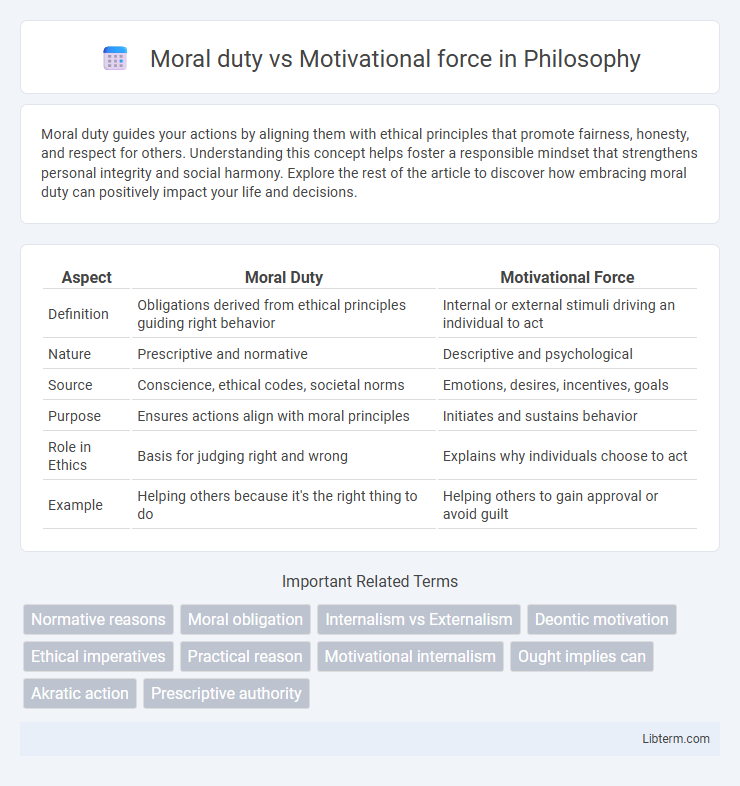Moral duty guides your actions by aligning them with ethical principles that promote fairness, honesty, and respect for others. Understanding this concept helps foster a responsible mindset that strengthens personal integrity and social harmony. Explore the rest of the article to discover how embracing moral duty can positively impact your life and decisions.
Table of Comparison
| Aspect | Moral Duty | Motivational Force |
|---|---|---|
| Definition | Obligations derived from ethical principles guiding right behavior | Internal or external stimuli driving an individual to act |
| Nature | Prescriptive and normative | Descriptive and psychological |
| Source | Conscience, ethical codes, societal norms | Emotions, desires, incentives, goals |
| Purpose | Ensures actions align with moral principles | Initiates and sustains behavior |
| Role in Ethics | Basis for judging right and wrong | Explains why individuals choose to act |
| Example | Helping others because it's the right thing to do | Helping others to gain approval or avoid guilt |
Understanding Moral Duty: Definitions and Foundations
Moral duty refers to the ethical obligations individuals recognize based on principles such as justice, honesty, and beneficence, rooted in norms established by societal, cultural, or philosophical frameworks. Understanding moral duty involves examining deontological ethics, which emphasizes actions guided by inherent rightness rather than consequences, contrasting with motivational force that drives behavior through desires or incentives. Foundations of moral duty include Kantian imperatives that dictate acting according to universalizable maxims, underscoring the distinction between duty as an obligation and motivation as a personal impulse.
What Drives Motivational Force? Key Psychological Insights
Motivational force is driven primarily by intrinsic needs such as autonomy, competence, and relatedness, as identified in Self-Determination Theory. Psychological insights reveal that internal rewards like personal growth and purpose exert a stronger influence on motivation compared to external pressures or moral obligations. Neural mechanisms involving the mesolimbic dopamine system play a critical role in translating these intrinsic motivations into goal-directed behavior.
Comparing Moral Duty and Motivational Force: Core Distinctions
Moral duty refers to an ethical obligation that compels individuals to act according to principles of right and wrong, independent of personal desires or outcomes. Motivational force, on the other hand, drives behavior based on internal or external incentives, such as rewards, fears, or aspirations, which may not necessarily align with ethical considerations. The core distinction lies in moral duty being rooted in normative ethics, compelling action by a sense of universal rightness, while motivational force is grounded in psychological or practical factors that influence decision-making and behavior.
The Origins of Moral Obligations
Moral obligations originate from a complex interplay between ethical principles and human motivation, where moral duty serves as an inherent guide grounded in social norms and rational reflection. The motivational force behind these obligations stems from internal desires, emotions, or external consequences that drive individuals to act morally. Understanding their origins involves examining psychological theories and philosophical arguments that link moral cognition to both intrinsic values and motivational incentives.
Motivation in Human Behavior: Intrinsic vs Extrinsic Drivers
Motivation in human behavior is fundamentally influenced by intrinsic drivers such as personal values and self-fulfillment, which act as a moral duty guiding ethical actions without external rewards. Extrinsic drivers, including social recognition and financial incentives, function as motivational forces that encourage behavior to achieve tangible outcomes. Balancing these intrinsic and extrinsic motivations shapes decision-making processes and the consistency of moral conduct.
Moral Duty in Philosophy: Historical Perspectives
Moral duty in philosophy, prominently explored by Immanuel Kant, emphasizes actions driven by adherence to universal ethical principles rather than personal desires or external rewards. Historical perspectives trace moral duty to ancient Greek virtue ethics and Christian theological doctrines, which underscore obligations arising from reason, divine command, or social contracts. This concept contrasts with motivational forces, which are often linked to psychological incentives or emotional drives shaping human behavior.
Psychological Theories Behind Motivation
Psychological theories behind motivation, such as Self-Determination Theory and Expectancy Theory, differentiate moral duty as an intrinsic motivator rooted in personal values from motivational force driven by anticipated rewards or outcomes. Moral duty often aligns with internalized ethical standards that enhance autonomous motivation, whereas motivational force can be influenced by extrinsic incentives that activate goal-oriented behavior. Understanding this distinction is crucial for designing interventions that promote sustained engagement by aligning actions with individuals' core beliefs and external motivations.
Conflict or Harmony: When Duty Meets Motivation
Moral duty often stems from ethical principles demanding obligation, while motivational force arises from personal desires and incentives driving behavior. Conflict emerges when duty requires actions that contradict individual motivations, causing psychological tension or resistance. Harmony occurs when intrinsic motivation aligns with moral duty, enhancing commitment and ethical consistency in decision-making.
Moral Duty, Motivation, and Ethical Decision-Making
Moral duty serves as an intrinsic guideline compelling individuals to act according to ethical principles, often overriding personal desires or external rewards. Motivation in ethical decision-making can stem from both internal commitment to moral duty and external factors, yet true moral actions arise when motivation aligns with a genuine sense of responsibility. Ethical decision-making becomes robust when moral duty informs motivation, ensuring choices reflect integrity, fairness, and adherence to universal moral standards.
Cultivating Moral Duty and Motivational Force in Everyday Life
Cultivating moral duty involves internalizing ethical principles that guide consistent, value-driven actions aligned with societal well-being, while motivational force derives from personal desires and goals that energize behavior. Integrating both requires conscious reflection on moral values paired with setting purposeful intentions to sustain disciplined habits and foster resilience in decision-making. Practicing mindfulness and self-awareness strengthens this synergy, enabling individuals to transform abstract moral obligations into practical, motivating drivers for everyday conduct.
Moral duty Infographic

 libterm.com
libterm.com